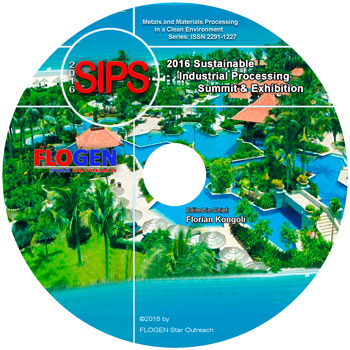2016-Sustainable Industrial Processing Summit
SIPS 2016 Volume 6: Yagi Intl. Symp. / Metals & Alloys Processing
| Editors: | Kongoli F, Akiyama T, Nogami H, Saito K, Fujibayashi A |
| Publisher: | Flogen Star OUTREACH |
| Publication Year: | 2016 |
| Pages: | 480 pages |
| ISBN: | 978-1-987820-46-1 |
| ISSN: | 2291-1227 (Metals and Materials Processing in a Clean Environment Series) |

CD shopping page
Environmental and Material Sustainability Through Value-Added Products Conversion From Bauxite Residue
Brajendra Mishra1;1WORCESTER POLYTECHNIC INSTITUTE, Worcester, United States;
Type of Paper: General Plenary
Id Paper: 246
Topic: 42
Abstract:
Bauxite residue, also known as red mud, has become a major challenge for the sustainable environmental management in the aluminum industry globally. The alkaline extraction of alumina from bauxite [Bayer Process] generates a major waste in the form of a residue. Approximately, a ton of red-mud is produced for every two tons of bauxite ore that are mined. The primary aluminum production generates approx. 120 million tonnes of red-mud each year globally. The red-mud produced from Jamaican bauxite is rich in hematite, alumina and titanium oxide. However, the composition of red-mud is dependent on bauxite ore. It has been shown that over 90 wt. pct. alumina can be recovered from red-mud by soda-ash sintering and caustic leaching that can be reverted back to the Bayer Process. Hematite can be reduced with a degree of metallization of over 94 pct. or over 92% of the hematite can be partially reduced to magnetite. A completely reduced material could be charged through the tuyeres in an iron blast furnace or smelted to produce pig iron as a potential application. A viable material balance shows that the entire amount of red mud can be effectively recycled. This presentation will describe the successful efforts of iron and alumina recovery. The problems associated with the use of reduced red-mud, as an alternative to direct-reduced iron [DRI] have been discussed. Critical assessment of the recovery sequence chosen for the products has been described. Current alternatives of producing inorganic polymers and insulating materials shall be discussed.
Keywords:
Aluminium; Construction; Hydrometallurgical; Recycling; Sustainability; Wastes;References:
[1] Fursman, J.E. Mauser, M.O. Butler, and W.A. Stickney, ‘Utilization of Red Mud Residues From Alumina Production’, U. S. Bureau of Mines Report of Investigations 7454, [1970].[2] Piga, F. Pochetti and L. Stoppa, ‘Recovering Metals from Red Mud Generated during Alumina Production’, JOM 45(11), pp.55-59, [1993].
[3] Braithwait, GB Patent No. 2078211-A. (Jan. 1982).
[4] Agency of Ind. Sci. Tech., J Patent No. 52152896-A. (Dec. 1977).
[5] Guccione, ‘Red mud,’ a Solid Waste, Can Now Be Converted To High-Quality Steel’, Eng. Min. J 172(9), pp. 136-138, [1971].
[6] Dakatos, M. Miskei, and J. Szolnoki, DE Patent No. 2747436. (May 1978).
[7] Cresswell, and D.J. Milne, AU Patent No. 88102. (Sept. 1981).
[8] Vachon, R. Tyagi; J-C. Auclair, and K.J. Wilkinson, ‘Chemical and Biological Leaching of Aluminum from Red Mud’, Environ. Sci. Technol. 28(1), pp. 26-30 [1994].
[9] Vereinigle Aluminium-Werke., FR Patent No. 2117930-A. (Dec. 1971).
[10] Baetz, R.C. Lightbourne, U.S. Patent No. 3690828. (Sept. 1972).
[11] B. Mishra, A. Staley and D. Kirkpatrick, ‘Recovery & Utilization of Iron from Red Mud’, Bauxite Treatment Residues: Products and Processes’ Light Metals 2001, Ed. J.L. Anjier, TMS Publications, Warrendale, PA, pp. 149-156, [2001]
[12] Jacob, Jr., Bauxite: Proceedings of the 1984 Bauxite Symposium, Los Angeles, California, New York, N.Y.: Society of Mining Engineers of American Institute of Mining, Metallurgical, and Petroleum Engineers, pp. 349-369, [1984].